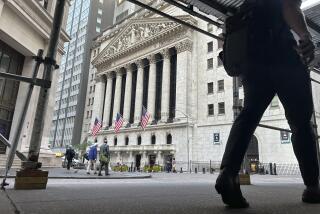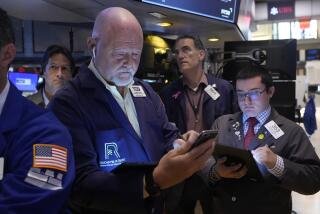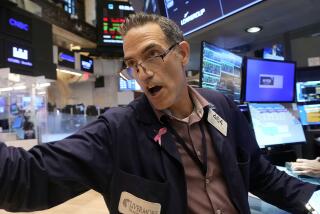Wall Street ends wildly volatile week on positive note
One of the wildest streaks in Wall Street history came to a tame close with blue-chip stocks not far from where they were when the week began.
After four consecutive days of 400-point swings, the Dow Jones industrial average rose a relatively modest 125 points Friday to bring the blue-chip average only 1.5% lower for the week. At one point this week, the Dow was down a dizzying 7.3%.
The subdued trading was a relief for investors who have been buffeted by a stream of bad news in recent weeks. Stocks have been swinging all week as investors reacted to an unprecedented downgrade in U.S. debt, fears about a double-dip recession and worries about European banks.
“It appears as though we’ve come out of this week almost whole,” said Bernie McGinn, founder of McGinn Investment Management. “On Wednesday afternoon, no one would have suspected that.”
Friday’s rise came after the government announced that retail spending, one of the main drivers of the economy, rose last month at the fastest pace since April.
The promising figures, coming a day after a better-than-expected report on unemployment, were enough to beat back some of the fears that a new recession is on its way, though most market experts were exercising extreme caution in drawing conclusions from a few data points.
“The numbers were encouraging, but they were far from conclusive,” said Jim O’Sullivan, chief economist at MF Global.
The Dow ended the day up 125.71 points, or 1.3%, to 11,269.02. The broader Standard & Poor’s 500 index closed up 6.17 points, or 0.5%, to 1178.81.
The calm Friday was a far cry from the mood Monday, when the Dow plummeted 634 points on the first day of trading after Standard & Poor’s bumped the U.S. down from its AAA rating.
A day later, markets made a euphoric leap after the Federal Reserve announced that it was keeping interest rates low and considering additional measures to help the economy.
But Wednesday saw another plunge over fears that France’s financial system was coming under strain.
European markets rallied Friday after regulators in France, Spain, Italy and Belgium introduced temporary measures to halt short-selling of certain financial stocks.
“The French government has pledged to assure financial stability, avoid market abuses and fight against all forms of speculation,” French Finance Minister Francois Baroin said in a statement.
France’s leading stock index ended the day up 4%.
When the United States and Britain instituted similar measures during the 2008 financial crisis, the action gave bank stocks a short-term boost but was ultimately unsuccessful in protecting those stocks from big declines.
In the U.S., the market recovery at the end of this week came from some of the first recent signs of health from the nation’s economy.
Retail sales rose 0.5% in July, up from 0.2% a month earlier, the Commerce Department said.
The data were good enough that investors mostly ignored disappointing figures out Friday showing that consumer confidence fell sharply this month.
But many investors were wary of drawing conclusions from the two recent pieces of encouraging economic data given the mountains of discouraging news that have piled up in recent weeks about unemployment, declines in manufacturing and political paralysis.
“It seems like we’re just in the calm in the eye of the storm,” said Jack Ablin, chief investment officer at Harris Private Bank. “I don’t think anything’s really been resolved.”
Some market experts, though, say the stock surge of the last few days could be sustained if more promising economic signs come in next week, when housing industry data are released Tuesday and unemployment statistics are reported Thursday.
Even some market experts who see tough times ahead believe the stock market is due for a short-term rebound after the panicked selling earlier this week.
“The selling fed on itself,” said Phil Roth, a market analyst at Miller Tabak & Co. “When that kind of selling is done, you can get a recovery regardless of the fundamental background.”
More to Read
Inside the business of entertainment
The Wide Shot brings you news, analysis and insights on everything from streaming wars to production — and what it all means for the future.
You may occasionally receive promotional content from the Los Angeles Times.










